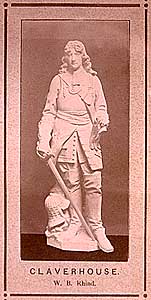 |
Claverhouse
Found on the south facade of the Scott Monument.
Claverhouse (from the novel 'Old Mortality', 1816) is shown in
the outfit of a Privy Councillor’s officer, with a tunic over
his frockcoat, a cummerbund round his middle, a belt with a large
circular buckle across his shoulder and high boots. He is holding
a basket hilted sword with his right and a document in his left
hand. His helmet is at his feet.
Colonel John Grahame of Claverhouse, later Viscount Dundee, known
as "Bluidy Clavers" to his enemies, the Covenanters and
"Bonnie Dundee" to his admirers, the Jacobites - is one
of the Privy Council's officers charged with suppressing the Covenanters.
"An oval face, a straight and well-formed nose, dark,
hazel eyes, a complexion just sufficiently tinged with brown to
save it from the charge of effeminacy, a short upper lip…slightly
shaded by small mustachios of light brown, joined to a profusion
of long curled locks of the same colour, which fell down on each
side of his face, contributed to form such a countenance as limners
love to paint and ladies to look upon." Yet "under this
soft exterior was hidden a spirit unbounded in daring and in aspiring,
yet cautious and prudent as that of Machiavel himself."
Comparing himself with Balfour of Burley, Claverhouse admits,
"we are both fanatics; but there is some distinction between
the fanaticism of honour and that of dark and sullen superstition."
Scott has Claverhouse predict his own death at Killiecrankie:
"When I think of death, Mr Morton, as a thing worth thinking of… it is in the hope of pressing one day some well-fought
and hard-won field of battle, and dying with the shout of victory
in my ear - that would be worth dying for, and more, it would
be worth having lived for!"
About the Sculptor
William Birnie Rhind (1853 to 1933)
W.B. Rhind was born and died in Edinburgh. He was the son of John
Rhind (sculptor of several of the other statues on the Monument,
see Ivanhoe) and studied under him before enrolling at the Edinburgh
School of Design under Hodder. He spent five years at the RSA (Royal
Scottish Academy) Life School.
He carved portraits, decorative and memorial groups as well as
busts and figures.
He was elected ARSA (Associate of the Royal Scottish Academy) in
1893, and RSA in 1905.
^ back to the top |



